Waldenburg | |
|---|---|
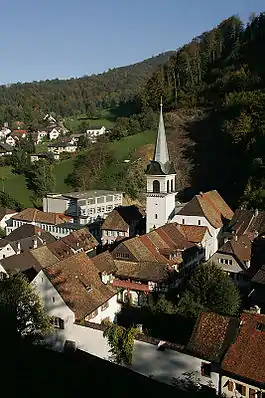 | |
 Flag  Coat of arms | |
Location of Waldenburg | |
 Waldenburg 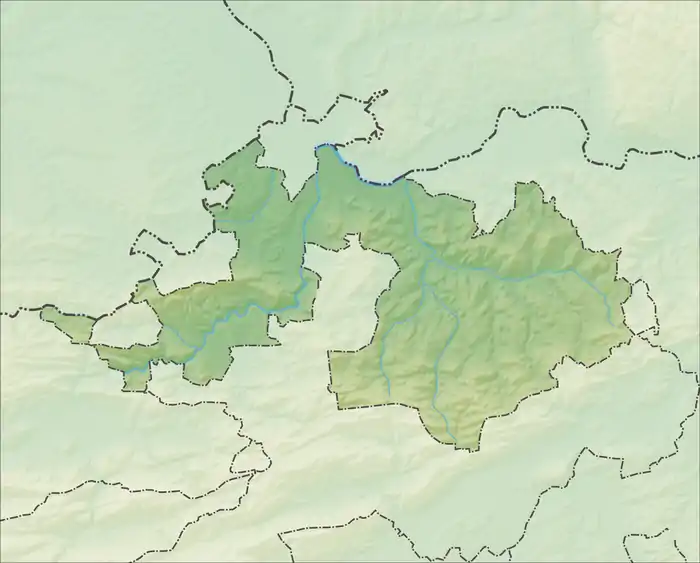 Waldenburg | |
| Coordinates: 47°23′N 7°45′E / 47.383°N 7.750°E | |
| Country | Switzerland |
| Canton | Basel-Landschaft |
| District | Waldenburg |
| Government | |
| • Mayor | Kurt Grieder |
| Area | |
| • Total | 8.30 km2 (3.20 sq mi) |
| Elevation | 532 m (1,745 ft) |
| Population (31 December 2018)[2] | |
| • Total | 1,081 |
| • Density | 130/km2 (340/sq mi) |
| Time zone | UTC+01:00 (Central European Time) |
| • Summer (DST) | UTC+02:00 (Central European Summer Time) |
| Postal code(s) | 4437 |
| SFOS number | 2895 |
| Surrounded by | Langenbruck, Liedertswil, Mümliswil-Ramiswil (SO), Oberdorf, Reigoldswil |
| Website | www SFSO statistics |
Waldenburg is a municipality in the canton of Basel-Country in Switzerland, and the capital of the district of the same name.
Geography
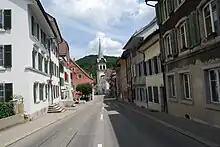
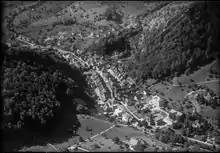
Waldenburg has an area, as of 2009, of 8.3 square kilometers (3.2 sq mi). Of this area, 2.61 km2 (1.01 sq mi) or 31.4% is used for agricultural purposes, while 5.18 km2 (2.00 sq mi) or 62.4% is forested. Of the rest of the land, 0.48 km2 (0.19 sq mi) or 5.8% is settled (buildings or roads) and 0.01 km2 (2.5 acres) or 0.1% is unproductive land.[3]
Of the built up area, housing and buildings made up 3.9% and transportation infrastructure made up 1.6%. Out of the forested land, 60.0% of the total land area is heavily forested and 2.4% is covered with orchards or small clusters of trees. Of the agricultural land, 0.1% is used for growing crops and 16.4% is pastures, while 1.3% is used for orchards or vine crops and 13.6% is used for alpine pastures.[3]
Coat of arms
The municipal coat of arms was introduced in 1926; it is that of the counts of Frohburg, who owned the village at the time of its first mention (1244); its blazon is Or, an Eagle displayed Vair, langued, beaked and membered Gules.[4]
Demographics
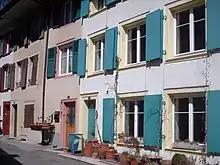
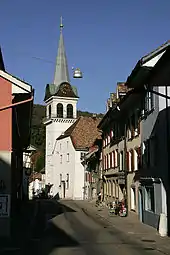
Waldenburg has a population (as of June 2021) of 1,124.[5] As of 2008, 27.2% of the population are resident foreign nationals.[6] Over the last 10 years (1997–2007) the population has changed at a rate of -9.8%.[7]
Most of the population (as of 2000) speaks German (1,067 or 80.3%), with Albanian being second most common (104 or 7.8%) and Italian being third (56 or 4.2%). There are 5 people who speak French and 1 person who speaks Romansh.[8]
As of 2008, the gender distribution of the population was 48.9% male and 51.1% female. The population was made up of 881 Swiss citizens (72.9% of the population), and 327 non-Swiss residents (27.1%)[9] Of the population in the municipality 363 or about 27.3% were born in Waldenburg and lived there in 2000. There were 304 or 22.9% who were born in the same canton, while 291 or 21.9% were born somewhere else in Switzerland, and 328 or 24.7% were born outside of Switzerland.[8]
In 2008 there were 8 live births to Swiss citizens and 5 births to non-Swiss citizens, and in same time span there were 10 deaths of Swiss citizens and 3 non-Swiss citizen deaths. Ignoring immigration and emigration, the population of Swiss citizens decreased by 2 while the foreign population increased by 2. There was 1 Swiss man who emigrated from Switzerland. At the same time, there were 9 non-Swiss men and 8 non-Swiss women who immigrated from another country to Switzerland. The total Swiss population change in 2008 (from all sources, including moves across municipal borders) was a decrease of 1 and the non-Swiss population decreased by 5 people. This represents a population growth rate of -0.5%.[6]
The age distribution, as of 2010, in Waldenburg is; 78 children or 6.5% of the population are between 0 and 6 years old and 208 teenagers or 17.2% are between 7 and 19. Of the adult population, 159 people or 13.2% of the population are between 20 and 29 years old. 129 people or 10.7% are between 30 and 39, 216 people or 17.9% are between 40 and 49, and 240 people or 19.9% are between 50 and 64. The senior population distribution is 112 people or 9.3% of the population are between 65 and 79 years old and there are 66 people or 5.5% who are over 80.[9]
As of 2000, there were 561 people who were single and never married in the municipality. There were 624 married individuals, 76 widows or widowers and 67 individuals who are divorced.[8]
As of 2000, there were 523 private households in the municipality, and an average of 2.5 persons per household.[7] There were 163 households that consist of only one person and 69 households with five or more people. Out of a total of 533 households that answered this question, 30.6% were households made up of just one person and 5 were adults who lived with their parents. Of the rest of the households, there are 150 married couples without children, 165 married couples with children There were 33 single parents with a child or children. There were 7 households that were made up unrelated people and 10 households that were made some sort of institution or another collective housing.[8]
In 2000 there were 211 single family homes (or 61.7% of the total) out of a total of 342 inhabited buildings. There were 68 multi-family buildings (19.9%), along with 41 multi-purpose buildings that were mostly used for housing (12.0%) and 22 other use buildings (commercial or industrial) that also had some housing (6.4%). Of the single family homes 62 were built before 1919, while 31 were built between 1990 and 2000.[10]
In 2000 there were 577 apartments in the municipality. The most common apartment size was 4 rooms of which there were 164. There were 12 single room apartments and 182 apartments with five or more rooms. Of these apartments, a total of 504 apartments (87.3% of the total) were permanently occupied, while 40 apartments (6.9%) were seasonally occupied and 33 apartments (5.7%) were empty.[10] As of 2009, the construction rate of new housing units was 1.7 new units per 1000 residents.[7] As of 2000 the average price to rent a two-room apartment was about 626.00 CHF (US$500, £280, €400), a three-room apartment was about 860.00 CHF (US$690, £390, €550) and a four-room apartment cost an average of 953.00 CHF (US$760, £430, €610).[11] The vacancy rate for the municipality, in 2010, was 0.51%.[7]
The historical population is given in the following chart:[12]

Heritage sites of national significance
The prehistoric hill settlement and medieval government center of Gerstelfluh and the villa Gedeon Thommen with park are listed as Swiss heritage site of national significance. The entire old village of Waldenburg is part of the Inventory of Swiss Heritage Sites.[13]
Politics
In the 2007 federal election the most popular party was the SVP which received 39.66% of the vote. The next three most popular parties were the SP (18.52%), the Green Party (16.47%) and the FDP (15.14%). In the federal election, a total of 282 votes were cast, and the voter turnout was 38.7%.[14]
Economy
As of 2010, Waldenburg had an unemployment rate of 4.5%. As of 2008, there were 37 people employed in the primary economic sector and about 11 businesses involved in this sector. 445 people were employed in the secondary sector and there were 14 businesses in this sector. 160 people were employed in the tertiary sector, with 36 businesses in this sector.[7] There were 675 residents of the municipality who were employed in some capacity, of which females made up 40.3% of the workforce.
In 2008 the total number of full-time equivalent jobs was 571. The number of jobs in the primary sector was 26, of which 20 were in agriculture and 6 were in forestry or lumber production. The number of jobs in the secondary sector was 416 of which 403 or (96.9%) were in manufacturing and 13 (3.1%) were in construction. The number of jobs in the tertiary sector was 129. In the tertiary sector; 17 or 13.2% were in wholesale or retail sales or the repair of motor vehicles, 29 or 22.5% were in the movement and storage of goods, 29 or 22.5% were in a hotel or restaurant, 5 or 3.9% were in the information industry, 1 was the insurance or financial industry, 4 or 3.1% were technical professionals or scientists, 12 or 9.3% were in education and 7 or 5.4% were in health care.[15]
In 2000, there were 520 workers who commuted into the municipality and 458 workers who commuted away. The municipality is a net importer of workers, with about 1.1 workers entering the municipality for every one leaving. About 6.0% of the workforce coming into Waldenburg are coming from outside Switzerland.[16] Of the working population, 23.9% used public transportation to get to work, and 45.9% used a private car.[7]
Religion
From the 2000 census, 275 or 20.7% were Roman Catholic, while 613 or 46.2% belonged to the Swiss Reformed Church. Of the rest of the population, there were 27 members of an Orthodox church (or about 2.03% of the population), there was 1 individual who belongs to the Christian Catholic Church, and there were 11 individuals (or about 0.83% of the population) who belonged to another Christian church. There was 1 individual who was Jewish, and 200 (or about 15.06% of the population) who were Islamic. There were 2 individuals who were Buddhist, 2 individuals who were Hindu and 1 individual who belonged to another church. 158 (or about 11.90% of the population) belonged to no church, are agnostic or atheist, and 37 individuals (or about 2.79% of the population) did not answer the question.[8]
Weather
Waldenburg has an average of 140.4 days of rain or snow per year and on average receives 1,155 mm (45.5 in) of precipitation. The wettest month is June during which time Waldenburg receives an average of 127 mm (5.0 in) of rain or snow. During this month there is precipitation for an average of 12.9 days. The month with the most days of precipitation is May, with an average of 13.9, but with only 110 mm (4.3 in) of rain or snow. The driest month of the year is October with an average of 79 mm (3.1 in) of precipitation over 9 days.[17]
Education
In Waldenburg about 469 or (35.3%) of the population have completed non-mandatory upper secondary education, and 130 or (9.8%) have completed additional higher education (either university or a Fachhochschule). Of the 130 who completed tertiary schooling, 56.2% were Swiss men, 22.3% were Swiss women, 14.6% were non-Swiss men and 6.9% were non-Swiss women.[8]
As of 2000, there were 18 students in Waldenburg who came from another municipality, while 96 residents attended schools outside the municipality.[16]
Transport
Waldenburg is the terminus of the Waldenburg narrow gauge railway, which operates a half-hourly train service to the town of Liestal. At Liestal railway station, onward connection is made with the Swiss Federal Railway's services to Basel, Bern, Lucerne and Zürich.[18]
References
- ↑ "Arealstatistik Standard - Gemeinden nach 4 Hauptbereichen". Federal Statistical Office. Retrieved 13 January 2019.
- ↑ "Ständige Wohnbevölkerung nach Staatsangehörigkeitskategorie Geschlecht und Gemeinde; Provisorische Jahresergebnisse; 2018". Federal Statistical Office. 9 April 2019. Retrieved 11 April 2019.
- 1 2 Swiss Federal Statistical Office-Land Use Statistics 2009 data (in German) accessed 25 March 2010
- ↑ Flags of the World.com accessed 11-March-2011
- ↑ Canton of Basel-Land Statistics, Wohnbevölkerung nach Nationalität und Konfession per 30. Juni 2021 (in German) accessed 22 September 2021
- 1 2 Swiss Federal Statistical Office - Superweb database - Gemeinde Statistics 1981-2008 (in German) accessed 19 June 2010
- 1 2 3 4 5 6 Swiss Federal Statistical Office accessed 11-March-2011
- 1 2 3 4 5 6 STAT-TAB Datenwürfel für Thema 40.3 - 2000 Archived 2013-08-09 at the Wayback Machine (in German) accessed 2 February 2011
- 1 2 Canton of Basel-Land Statistics, Wohnbevölkerung nach Nationalität und Konfession per 30. September 2010 (in German) accessed 16 February 2011
- 1 2 Federal Statistical Office STAT-TAB - Datenwürfel für Thema 09.2 - Gebäude und Wohnungen Archived 2015-01-21 at the Wayback Machine (in German) accessed 28 January 2011
- ↑ Canton of Basel-Land Statistics Archived 2010-11-07 at the Wayback Machine, Mieter- und Genossenschafterwohnungen1 nach Zimmerzahl und Mietpreis 2000 (in German) accessed 20 February 2011
- ↑ Swiss Federal Statistical Office STAT-TAB Bevölkerungsentwicklung nach Region, 1850-2000 Archived 2014-09-30 at the Wayback Machine (in German) accessed 29 January 2011
- ↑ "Kantonsliste A-Objekte:Basel-Landschaft" (PDF). KGS Inventar (in German). Federal Office of Civil Protection. 2009. Archived from the original (PDF) on 6 July 2011. Retrieved 12 July 2010.
- ↑ Swiss Federal Statistical Office, Nationalratswahlen 2007: Stärke der Parteien und Wahlbeteiligung, nach Gemeinden/Bezirk/Canton (in German) accessed 28 May 2010
- ↑ Swiss Federal Statistical Office STAT-TAB Betriebszählung: Arbeitsstätten nach Gemeinde und NOGA 2008 (Abschnitte), Sektoren 1-3 Archived 2014-12-25 at the Wayback Machine (in German) accessed 28 January 2011
- 1 2 Swiss Federal Statistical Office - Statweb Archived 2012-08-04 at archive.today (in German) accessed 24 June 2010
- ↑ "Temperature and Precipitation Average Values-Table, 1961-1990" (in German, French, and Italian). Federal Office of Meteorology and Climatology - MeteoSwiss. Archived from the original on 27 June 2009. Retrieved 8 May 2009., the Waldenburg weather station elevation is 525 meters above sea level.
- ↑ "Abfahrt Bahnhof Liestal" (PDF). Swiss Federal Railways. Archived from the original (PDF) on 23 January 2015. Retrieved 23 January 2015.
External links
- Official website (in German)
- Waldenburger Rail Line
 Media related to Waldenburg at Wikimedia Commons
Media related to Waldenburg at Wikimedia Commons